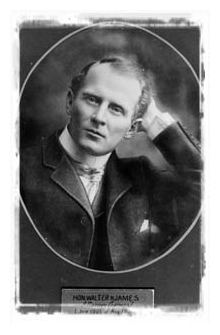 |
Walter James (1863-1943)
 Walter James was a lawyer and politician who actively campaigned for Federation.
Born in Perth, his parents were publicans and he was educated at government
schools and Perth High School. James was articled to George Leake in 1883,
studying in Perth and London before being admitted to the Western Austalian
Bar in 1888, and eventually forming his own practice in 1896.
Walter James was a lawyer and politician who actively campaigned for Federation.
Born in Perth, his parents were publicans and he was educated at government
schools and Perth High School. James was articled to George Leake in 1883,
studying in Perth and London before being admitted to the Western Austalian
Bar in 1888, and eventually forming his own practice in 1896.
Committed to egalitarianism and Australian nationalism, James entered State
politics in 1894 when he won the working-class Legislative Assembly seat
of East Perth. While in Parliament he sat as an independent, successfully
introducing a range of social reforms. He took an active part in establishing
a compulsory, free, secular education system, and was an advocate for female
suffrage in the period 1897-99.
James represented Western Australia at the Australasian Federal Convention
held in Adelaide, Sydney and Melbourne in 1897 and 1898. Behind the scenes
he helped negotiate section 95 of the Constitution which provided for Western
Australian customs' duties to be phased out over a ten-year period, softening
the blow Federation would bring to State finances. His suggestion that State
courts be given federal jurisdiction was also adopted. In May 1898 he helped
found the Federal League to campaign for Federation. During the next two
years he became increasingly critical of John Forrest for refusing to put
the question to referendum. His letter of 16 September 1899 to fellow federalist
John Kirwan, suggests much of his frustration:
"Opportunism is always present in politics but it is so
flagrant here as to be indecent. I should like to hear from you on this
matter. We know so little of each other that it may seem strange that
I should write to you, but you are young as I am and can, I feel sure,
understand the position in which I am placed ... I do not care for the
ins and outs system of party government but things are lopsided now when
Forrest runs entirely upon the Ins policy and has no other object than
to keep office." [Battye Library, Acc 383A]
James led a small group of like-minded independent reformers in Parliament,
and until 1902 he did not hold public office. With the death of the Premier
George Leake, James took power, with support from the Labor Party, at a
difficult time when the Commonwealth and States were trying to establish
ways of working together. He was often in dispute with federal ministers
Deakin and Kingston over issues like the occupancy of transferred buildings,
channels of communication, governmental functions, State debts, and refunds
of customs revenue. Although firmly committed to Federation he was concerned
at what he believed was the failure of co-operative federalism.
Following the election of 1904, Labor combined with the Conservatives to depose James as Premier. The Labor Party had become the largest party in Parliament and was unhappy with the pace of change. Retiring from politics, James took up the important position of Agent-General in London from 1904 to 1906 before returing to Perth to resume a private career in law.
|
 |